Wise words for Wednesday 24 May 2023published at 07:22 BST 24 May 2023
Our proverb of the day:
Quote MessageLife is like a towel, the part that cleans the buttocks today may clean the face tomorrow."
Sent by Uhonoma Ogieva to BBC News Pidgin
Our proverb of the day:
Quote MessageLife is like a towel, the part that cleans the buttocks today may clean the face tomorrow."
Sent by Uhonoma Ogieva to BBC News Pidgin
Scottish diplomat Mike Nithavrianakis quit the Italian city to become UK ambassador to Somalia.
Read MoreA YouTuber who advises Nigerians on coming to the UK says some students are motivated by work not study.
Read MoreHow corruption backed by a criminal network have led to South Africa's worst-ever power cuts.
Read MoreWe'll be back on Wednesday morning
That's all from the BBC Africa Live team for now. We'll be back on Wednesday morning with the latest from around the continent.
In the meantime, you can get updates on BBCAfrica.com or listen to the BBC's Africa Today podcast.
A reminder of our wise words of the day:
Quote MessageThe pride of a poor person is in their assertiveness."
A Bemba proverb sent by Agrippa M Chanda in Lusaka, Zambia
Click here to send us your African proverbs.
And we leave you with this photo of people swimming in the White Nile River near the al-Dabbasin bridge in Sudan's capital, Khartoum, earlier on Tuesday as the latest ceasefire aimed at ending the devastating conflict appears to be largely holding.
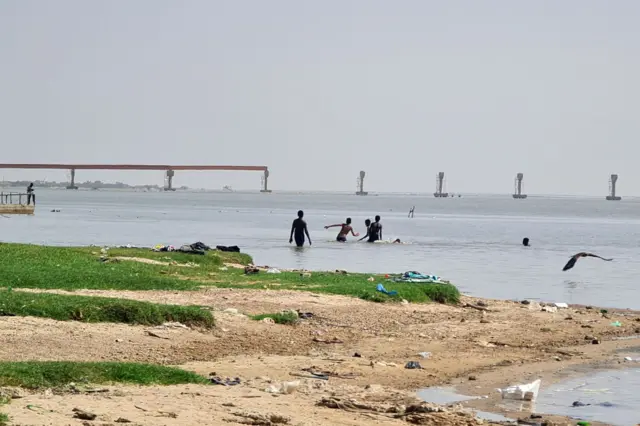 Image source, AFP
Image source, AFPNigeria’s outgoing president has opened a 1.6km (one-mile) bridge crossing the Niger River in the south-east of the country.
Muhammadu Buhari attended the inauguration ceremony virtually, via Zoom, where it was agreed it would be named after him.
It will be known as the Muhammadu Buhari Second Niger Bridge and links the city of Asaba in Delta State to Onitsha in Anambra State.
“Without investing in infrastructure, the road out of poverty is much tougher,” his assistant Buhari Sallau quoted the 80-year-old president as saying.
According to Mr Sallau, Anambra’s governor Charles Chukwuma Soludo said at the opening that it would not be inappropriate to call the president “Mr Infrastructure”.
It has been a busy day for Mr Buhari, who with less than a week left in office, commissioned six other projects over Zoom.
Mr Sallau posted some photos of the virtual events on social media:
Allow X content?
This article contains content provided by X. We ask for your permission before anything is loaded, as they may be using cookies and other technologies. You may want to read X’s cookie policy, external and privacy policy, external before accepting. To view this content choose ‘accept and continue’.
Mr Buhari's successor as president, Bola Tinubu, will be sworn in on Monday, after he was declared the winner of elections in February.
A election tribunal has said it will begin hearing petitions challenging the outcome the next day.
Priya Sippy
BBC Focus on Africa radio
A family who fled the fighting in Sudan’s capital, Khartoum, say they have been stuck on the border with Egypt for nearly a month waiting for visas.
Nakapi Samba, a 24-year-old university student, arrived in Wadi Halfa with her three siblings and parents on 30 April.
The family are originally from South Sudan and had settled in Khartoum after fleeing the civil war back home in 2015.
The latest conflict means their lives have been uprooted once again. Since the end of April they have been living in a mosque in Wadi Halfa as they wait for their visas to be granted.
“The situation here is not easy. We are laying on the floor. There is no access for good water,” Ms Samba told BBC Focus on Africa radio.
With no income, she says her family will soon run out of money - and everything comes at a price in border town, including going to the toilet.
“If you want something you have to pay for it.
“We can buy things in the market but we have no access for firewood to cook. We only buy ready food and snacks.
“The money [my parents] have saved won’t be enough for us for a long time. Only God can help us.”
Listen to the full interview:
Families who fled Khartoum are still waiting for entry into Egypt
Marina Daras
BBC News
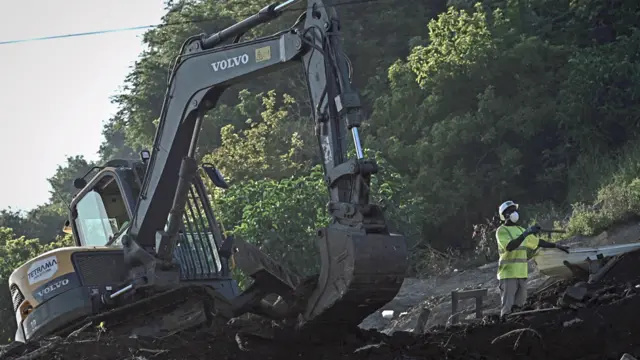 Image source, AFP
Image source, AFPOperation Wuambushu began on Monday and is set to continue all week
A controversial plan in the French Indian Ocean island of Mayotte to demolish slum dwellings has begun after weeks of legal setbacks.
It was set to start on 25 April, but was initially halted by a court ruling. Subsequent successful appeals mean the large-scale demolition has been allowed to proceed and will continue for the rest of the week
On Monday, police officers wielding crowbars were seen inspecting the houses made of metal sheets in a slum known as Talus 2 in the Majicavo neighbourhood, before diggers and bulldozers moved in to flatten them. About 160 shacks had been marked for demolition.
Nicknamed Operation Wuambushu, which means “take back” in local dialect, the slum demolitions aim to address substandard housing and illegal migration.
Any resident who does not have the right to stay on the island will be arrested and deported back to their country of origin.
But according to Thierry Suquet, the highest state official on the island, only half of the local residents with legal paperwork have been offered emergency relocation so far.
Mayotte is the poorest region of France but attracts many migrants from neighbouring countries, mainly the Comoros, in search of higher living standards.
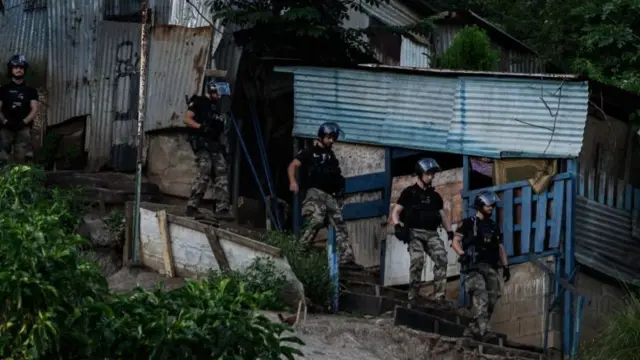 Image source, AFP
Image source, AFPHundreds of gendarmes have been deployed to Mayotte for the operation
Half of Mayotte’s 350,000 habitants do not have French nationality.
Hundreds of police officers have been deployed to the island to help to level thousands of illegal dwellings and oversee the deportations.
The plan has ignited a diplomatic row between France and the Comoros.
Azali Assoumani, president of the Comoros, said he would not accept Comorian deportees, claiming his country could not cope with the influx.
To make his point, he suspended docking authorisation for boats arriving from Mayotte.
But after a face-to-face meeting in Paris with President Emmanuel Macron earlier this month, Mr Assoumani agreed to some concessions.
He reinstated permission for sea traffic between the two islands, but said only “voluntary returnees” would be accepted back home.
 Will Ross
Will Ross
Africa editor, BBC World Service
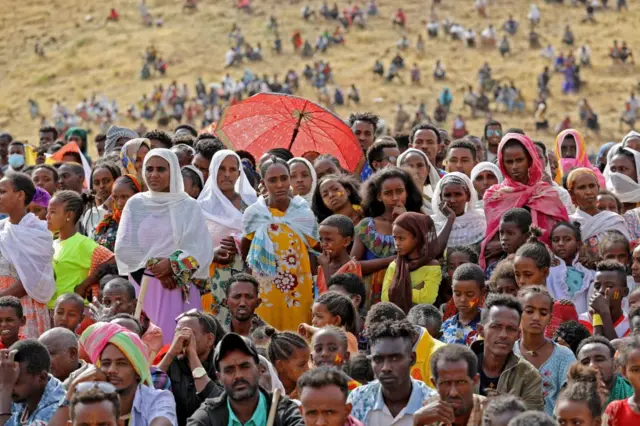 Image source, AFP
Image source, AFPTens of thousands fled or were internally displaced during the two-year conflict
Thousands of people in Ethiopia's Tigray region have staged protests calling for residents who fled during the recent two-year war to be allowed to return.
A peace deal in November ended the fighting between pro-government forces and Tigrayan fighters.
But a long-standing land dispute between Tigray and Amhara, which was exacerbated by the conflict, was not resolved.
Tigrayans say the presence of Amhara officials is preventing them from returning to their homes.
At protests in the cities of Mekelle, Adigrat and Shire they also called for the delivery of humanitarian aid and the withdrawal of Amhara forces and Eritrean troops.
Last week the leader of the regional government in Tigray said Eritrean soldiers were still present.
The BBC cannot verify their presence.
For the first time since conflict erupted there appears to be relative peace in Sudan's capital.
Read MoreForeign postgraduate students on non-research courses will no longer be able to bring family members to the UK, under new immigration curbs.
Nigerian nationals are among top five nationalities granted sponsored study visas to the UK.
Statistics show, external that Nigerian nationals saw the second largest percentage rise in the number of visas granted, increasing from 6,798 in 2019 to 59,053 in 2022.
Last year, Nigerian sponsored study visa holders in the UK had the highest number of dependants - 60,923, increasing from 1,586 in 2019.
The announcement by the UK government has been made two days before official statistics are expected to show legal migration has hit a record 700,000 this year.
From January 2024, partners and children of postgraduate students other than those studying on courses designated as research programmes will no longer be allowed to apply to live in the UK during the course.
Currently, students coming to the UK with a visa need to provide documents proving their relationship to dependants, who have to pay £490 for a visa.
Dependants are also required to pay the immigration health surcharge - an annual contribution between £470 ($584) and £624 towards NHS services.
Read more:
Prince Alemayehu was taken to Britain aged seven in 1868 and died an orphan there 11 years later.
Read More Thomas Naadi
Thomas Naadi
BBC News, Accra
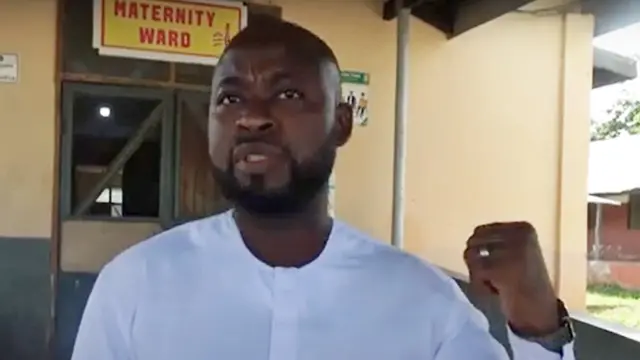 Image source, Citi News
Image source, Citi NewsDr Gbeadese Ahmed said the babies died because the hospital had been unable to connect to the national blood bank
Electricity has been restored to a hospital in northern Ghana to the joy of a doctor who said two babies had died there after a state-owned energy firm disconnected their power earlier this month.
Dr Gbeadese Ahmed from St Anne’s Hospital in Damango told the BBC he was about to go into theatre to resume surgical operations put on hold seven days ago.
Local MP and Lands Minister Samuel Abdulai Jinapor had paid off part of the hospital’s debt to the Northern Electricity Distribution Company (Nedco), he said.
The politician's intervention followed Dr Ahmed’s interview on Monday with Citi News, external about the effects of the power outage on the state-run hospital in the town, which is more than 630km (390 miles) by road from the capital, Accra.
He explained that two babies had died and three others were in a critical condition because without electricity medics at St Anne’s have been unable to organise blood transfusions for the new-borns.
The problems began at the hospital on 4 May when the power was first cut over a debt of more than $370,000 (£342,000).
This is when the first baby died, according to Dr Ahmed.
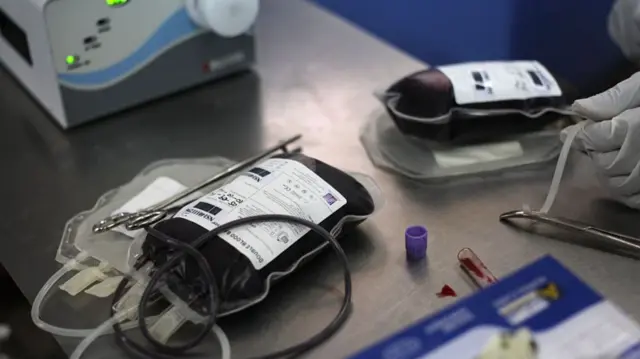 Image source, Getty Images
Image source, Getty ImagesWithout power, the hospital had also been unable to test for compatible blood for transfusions
The electricity was restored but Nedco warned if the bill was not settled in full it would again shut off power - and this happened on 16 May.
The second baby died over the last week.
Since the beginning of May Ghana’s state power firms have been cracking down on defaulters in an effort to claw back millions of dollars owed to them.
Several government institutions have found themselves cut off for failing to settle their bills.
Fikile Mbalula says that incessant power cuts in South Africa have "made a mess of our country".
Read More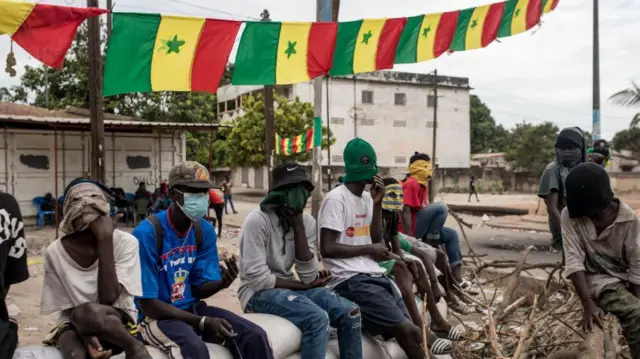 Image source, AFP
Image source, AFPPeople in Ziguinchor are barricading the road leading to Ousmane Sonko's house
The trial of Senegal’s opposition leader on charges of rape has resumed, but Ousmane Sonko failed to appear in court for a second time.
Security forces patrolled the streets of the capital, Dakar, fearing trouble from his supporters.
Mr Sonko is very popular among young people.
The 48-year-old politician says the trial, which started last week, is politically motivated and aimed at stopping him running for the presidency next year.
He denies sexually assaulting a woman, who worked in a massage parlour, as well as making death threats against her.
The former tax inspector is believed to be in the southern city of Ziguinchor, where he is mayor, according to the AFP news agency.
Protesters there have been barricading the road to his house to stop his potential arrest.
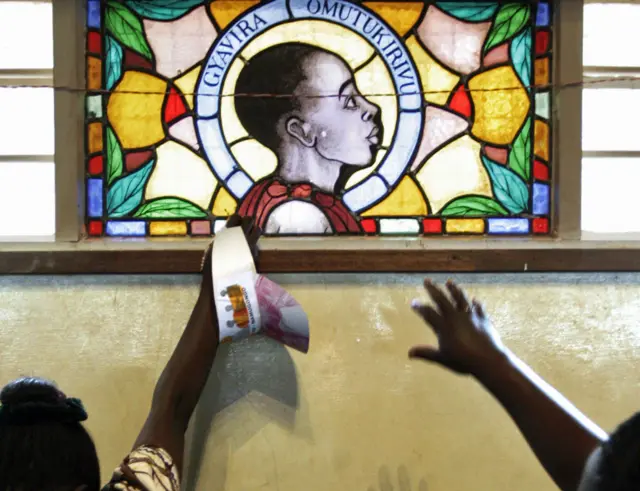 Image source, Getty Images
Image source, Getty ImagesMartyrs' Day commemorates 45 Ugandans killed between 1885 and 1887 for converting to Christianity
Ugandan police have restricted night movement for Christian pilgrims travelling to Namugongo Shrine for next month's Martyrs’ Day celebrations, citing safety reasons.
Pilgrims from the neighbouring countries of Democratic Republic of Congo, Kenya, Tanzania, Rwanda, Burundi, and South Sudan, as well as those from the furthest districts in Uganda, have started trekking on foot to Namugongo.
Police chief Okoth Ochola has directed regional commanders to ensure the pilgrims sleep in churches, schools and community centres.
No incidents of crime had so far been reported, he said, and he ordered officers to provide security for those making the pilgrimage.
On Monday, police spokesperson Fred Enanga urged the pilgrims, especially those who had not made the trip before, to be vigilant as they can often be targeted by criminals.
Ambulances were on standby on all major highways for medical evacuation and emergency response, he added.
Martyrs' Day is a national public holiday in Uganda and more than a million pilgrims are expected to make the journey to commemorate 45 martyrs, both Catholic and Anglican, who were killed between 1885 and 1887 on orders of Kababa Mwanga II, then king of Buganda, for converting to Christianity.
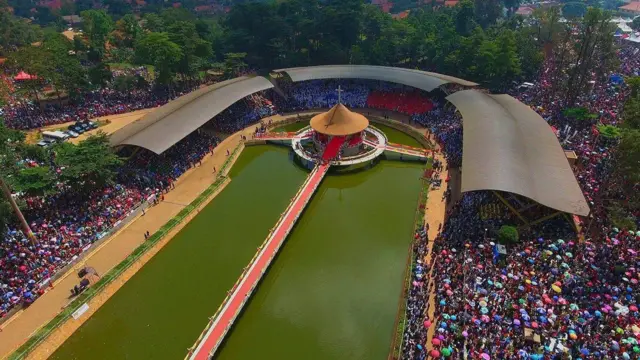 Image source, Uganda Episcopal Conference/Twitter
Image source, Uganda Episcopal Conference/TwitterMore than a million pilgrims are expected at Namugongo Shrine this year
Kenyan police say they are hunting for the former leader of the outlawed Mungiki gang, Maina Njenga, after seizing two firearms and cannabis from a home linked to him in western Nakuru county.
The items were recovered following a raid mounted by detectives in Ngomongo village last week, the Directorate of Criminal Investigations (DCI) said in a statement, external on Monday.
Eight suspected members of the Mungiki sect were arrested during the raid, police said.
Mr Njenga was summoned to appear at police headquarters in Nakuru, but failed to do so and instead went into hiding, local media reported.
Corporal Eliud Misoi, a detective based in Nakuru, said the eight individuals who were arrested were suspected to be members of an organised criminal gang.
This comes a few weeks after Mr Njenga's homes in the capital, Nairobi, and in central Laikipia county were reportedly raided by security officers for unknown reasons.
The Mungiki is a secretive sect that was banned in 2002 after being accused of being involved in violence and organised crime.
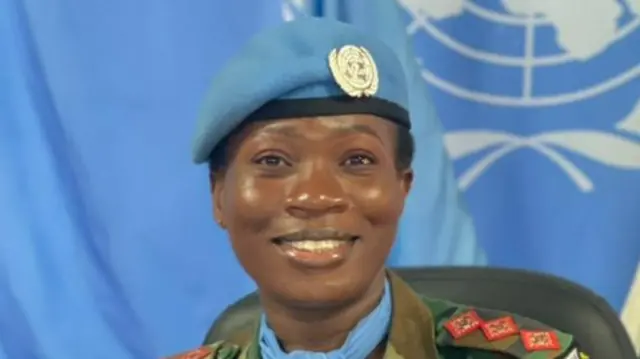 Image source, United Nations/Twitter
Image source, United Nations/TwitterCaptain Cecilia Erzuah is the first Ghanaian peacekeeper to receive the prestigious award
A Ghanaian peacekeeper serving in the disputed Sudan-South Sudan border region of Abyei has won a UN award for championing the rights of women.
Captain Cecilia Erzuah, 32, will receive the 2022 UN Military Gender Advocate of the Year award from UN Secretary-General António Guterres on Thursday.
“On every front, Captain Erzuah’s work has set the standard for ensuring that the needs and concerns of women are reflected across our peacekeeping operations,” said Mr Guterres in a statement, external.
Captain Erzuah has served in Abyei since March 2022 as the commander of the Ghana engagement platoon
Ghana is currently the largest contributor of women peacekeepers in the UN with 375 now deployed.
A fresh seven-day truce is officially under way - although more hostilities have been reported.
Read MoreThe move comes after some Indian cough syrups were linked to deaths in The Gambia and Uzbekistan.
Read More